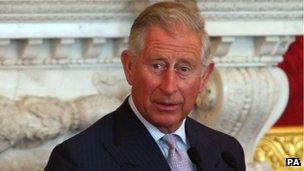'Public interest' in Prince Charles's letters
- Published

The attorney general blocked the release of the letters last year
The attorney general failed to consider public interest in the publication of Prince Charles's letters to the government when he blocked publication, the High Court has been told.
Guardian journalist Rob Evans has asked for a judicial review of the decision, which overrode a freedom of information tribunal decision approving release.
His lawyer said the attorney general had "adopted an impermissible blanket approach" to the letters.
The case is being heard over two days.
In October last year, Attorney General Dominic Grieve blocked the release of the private letters from the Prince of Wales to seven government departments during a seven-month period in 2004 and 2005.
'Across the board'
He said it was an exceptional case, where the letters formed part of the prince's "preparations for kingship".
Dinah Rose QC, representing Mr Evans, said in written argument before the court that the attorney general had "adopted an impermissible blanket approach, unreasonably failing to consider the public interest balance in respect of each individual piece of correspondence".
The freedom of information tribunal judges had ruled that Mr Evans was entitled to "advocacy correspondence" written by Prince Charles - described as letters he had written seeking to advance the work of charities or to promote views.
Ms Rose added: "Even if there are particular sensitivities arising from particular letters or passages within them which would entitle the defendant (Attorney General) to hold, on reasonable grounds, that they are exempt from disclosure, it is highly unlikely that such sensitivities apply across the board."
She said he should have "applied his mind to each item separately so that letters or passages in respect of which there is no overwhelming public interest against disclosure" should be released to Mr Evans.
Veto decision
Last year Mr Grieve issued a certificate vetoing disclosure under section 53 of the Freedom of Information Act 2000 and under the Environmental Information Regulations 2004.
Ms Rose argued that section 53 could not lawfully be applied to environmental information because "the exercise by the executive of that power to override the decision of an independent and impartial tribunal" was incompatible with EU law.
The error had also led Mr Grieve wrongly to apply section 53 "to the entirety of the information" which was the subject of the disclosure request when he had "no power to prevent all the correspondence falling into the public domain", she said.
The attorney general's legal team are arguing that his decision to make the section 53 certificate "was plainly a decision that was open to him".
The hearing was adjourned until Thursday.
- Published16 October 2012